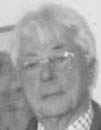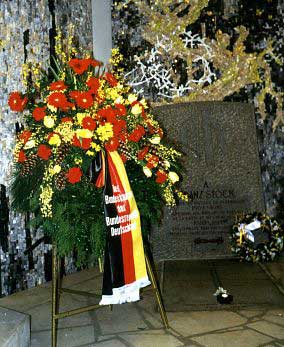O n March 1, 1998, the festivity commenced for the 50th day of death of this German priest The pontifical mass was celebrated by the archbishop of Paris, cardinal Lustiger together with many French and German bishops. Chancellor Helmut Kohl, who had laid down a wreath on the grave of Stock in the church Saint Jean Baptiste, was present, accompanied by Monsieur Monory, president of the Senate and consequently the second man of the French state. The cathedral was filled with many faithful, among them approximately 300 Germans.
n March 1, 1998, the festivity commenced for the 50th day of death of this German priest The pontifical mass was celebrated by the archbishop of Paris, cardinal Lustiger together with many French and German bishops. Chancellor Helmut Kohl, who had laid down a wreath on the grave of Stock in the church Saint Jean Baptiste, was present, accompanied by Monsieur Monory, president of the Senate and consequently the second man of the French state. The cathedral was filled with many faithful, among them approximately 300 Germans.
 What has induced the French church to celebrate this day for a German with such a splendor? Who was this Abbé Franz Stock? Soon after his death the French people assigned to him the epithet "L'Aumonier de l'Enfer" - "Clergyman of Hell ".
What has induced the French church to celebrate this day for a German with such a splendor? Who was this Abbé Franz Stock? Soon after his death the French people assigned to him the epithet "L'Aumonier de l'Enfer" - "Clergyman of Hell ".
Franz Stock was born 1904 as the first child of a worker’s family in Neheim, in the northern part of Sauerland. During his time at school and in the years of his youth he occupied himself mainly with the idea of peace. Hence he was participating 1926 the peace meeting “Peace through youth” in Bierville near Paris. It was the time in between both world wars, where intensive efforts for a reconciliation were aspired by the French and German side, where on the other hand the confrontation increased and with the takeover of Hitler a direction was followed which would end in a catastrophe for Germany and also for Europe.
Franz Stock was consecrated as priest during 1932. During 1934 he was appointed as principal of the German Community in Paris. But only 1940, one year after the outbreak of the war and occupation of
France by German troops, began for Abbé Stock his actual task, for which Providence of God had chosen him.
After the appeal of de Gaulle over the British radio June 18, 1940, the underground organization in France, the Resistance, was set up against the German occupation forces. Both jails in Paris soon were full with resistance fighters, later on also with hostages. It is estimated, that alone in the jail of Fresnes there were imprisoned during 1942 – 1944 about 11,000 Frenchmen. No admittance was allowed to French priests. Only Franz Stock was ordered by the military authorities to look after the captives. Now and then he was assisted by other military clergymen. Basically, however, he was alone. Thus he could be found almost daily within these walls of silence, of terror and torture. Soon Fresnes should be called the “antechamber of death”. “subsidiary of hell”. General Cosse-Brissac, captive of Fresnes, declares: „For his sake I have forgotten all those who persecuted me. For his sake I have sworn to myself, to do everything, to reach a truthful reconciliation of both people, Germany and France, under the sign of Christ”.
But a still greater burden for Abbé Stock was the care of Frenchmen, sentenced to death and the accompaniment of them to the execution site at the fortress territory of Mont Valerien in Suresnes, the Western entry area of Paris. Franz Stock mentions in his diary the names of 863 shot there to death. But according to his own statements he had accompanied more than 2000 convicts at the execution site. The memorial tablet on Mont Valérien specifies the figure of 4500. Abbé Stock, while facing the archbishop Jäger of Paderborn, stated: „What I experience here is so terrible, that I am sleepless for many nights.” Exemplary is the death of count Estienne d’Orves, who embraced the war judge Keyser and told him, that both of them, as French and German Officers, hade done their obligation.
The entanglement is evident here, into which many people of that time were placed. And if one thinks about that time more intensely, then one has to draw the conclusion, that such an extent of human brutality and bestiality gives a signal about the seduction of people by God opposing powers, which we learn particularly by its effects but cannot comprehend in their state of being with the means of our intellect. Accordingly mother superior of the Augustine monastery Melestroit in Brittany, Yvonne Beauvis, during a vision in the year 1922, predicted the 2nd World War and in it the onset of demoniac powers upon Europe. Anna Katharina of Emmerich (1774-1824) said this in a similar way in her vision about hell. Elisabeth of Guttenberg, mother of the secretary of state Karl Theodor of Guttenberg, an advisor of Adenauer, describes a scene at the National Party Congress 1936 in Nuremberg, where she was able to observe Hitler closely on the honorary tribune: „No doubt, there is a demoniac power which spoke out this voice. On this very day I became aware, that Hitler must be obsessed, that his power was the one of someone else, that the hypnotic attraction which he exercised on people was the power of evil.”
August 1944, when the American forces captured Paris, Abbé Stock became a prisoner of the American forces and was soon transported to a prisoner of war camp in Cherbourg. Here, Abbé Rodhain and Abbé Le Meur of the Secours Catholique presented to him the request, he may accept responsibility for the management of a seminary for captured German theology students as their superior. He did agree. This “Seminary behind barbed wire” was initially located at Orleans but then moved to Chartres. Stock managed it from 1945 until 1947, when it was closed. More than 900 captured students of theology had there the possibility to continue their studies or to commence same.
Nuncio Roncalli, the latter Pope John XXIII, has visited this seminary four times. During one of these visit he said: “The seminary of Chartres gives credit to both, France and Germany, It is very well suited, to become a sign of understanding and reconciliation.” And it is certainly not a coincidence, but a foreordination of God, that this seminary stood in the shadow of the world famous cathedral of Chartres, this treasure of Christendom, which expresses in an unsurpassable condensed way the doctrine of church. Reinhold Schneider emphasized in his sonnet „Farewell to Chartres“ directed to the seminarists, „The holy space entrusted to all, chose you for protruding portals.“ An allusion, that it is a center of European spirituality and that Europe can recover its full identity when this Christian spirituality unfolds again.
After closing of the seminary Abbé Stock stayed in France and died all of a sudden and unexpectedly February 28, 1948, not yet 44 years old, in the Hospital Chochin in Paris. His burial was more than pitiful. Only hardly a dozen people followed his coffin to the cemetery of Thiais in Paris.
Only slowly acclaim of his work forged a path. 1949 the first public commemoration ceremony took place in the Invalids Dome of Paris. 1951 he was moved and the families of the imprisoned and those shot to death donated the gravestone with the inscription „PAX“. 1963 was a decisive year. Exactly during the days when the French National Assembly approved the German-French Reconciliation contract, which Adenauer and de Gaulle had concluded January 22,1963, Abbé Stock was moved from Paris to Chartres to the newly constructed church Saint Jean Baptiste. On his death-bed Pope John XXIII had signed the telegram for this hour of celebration – like a bequeathal. 1990 the place in front of the big memorial at the execution site of Mont Valerien, the "Memorial de la France Combattante" was named "Place de l'Abbé Franz Stock". It is more than remarkable, that this place, where French people had suffered so much from Germans, was given the name of a German. In the German – French history, full of tension, there had never been such a time, where the abyss between both our people has been greater than during the time of occupation of the Second World War, and this abyss was nowhere else more perceptible than here at the Mont Valerien. And paradoxically, here are the roots of the German-French reconciliation and friendship. From France I received 1992 following text: "Here (from the chapel on Mont Valerien) Abbé Franz Stock, a German priest, has accompanied Frenchmen, sentenced to death, upto the support beam. He testifies before history, that here are the roots of the German-French reconciliation and the foundation of the European unification."
In this text the statement of the canon Pierre André, secretary of bishop Harscouet of Chartres, stands confirmed „The Mont Valérien and the Seminary of Chartres, both are foundations of the German-French reconciliation." This reconciliation has the character of a model, it has been the prerequisite for the further development of the European unification.
Very often there have been discussions about the miracle of the German-French reconciliation and it was after the end of the war, when all atrocities of the Nazis became known, hardly imaginable, that somehow an approach may take place. But the work of Abbé Franz Stock has contributed decisively, that the abyss between our people was bridged. It cannot be emphasized enough, and it is also hardly known, that men of the church have been the ones setting the first decisive points for a reconciliation between France and Germany, thus creating the prerequisites for the European unification. The politicians have followed the course of this development only later on.
Casting to-day a retrospective glance on the 50 years postwar history, one recognizes, when looking at it more closely and knowing the background of this development, the work of Divine Providence, channelling the evil for the best. And the declaration of the mother superior Yvonne Beauvais in her vision stands confirmed, when she said: „Then came a time, for which I was unable to solve the riddle. After all I saw a luminous, the world peace inspiring, France.”
Dieter Lanz: Abbé Franz Stock. Kein Name – ein Programm. Bonifatius. Paderborn 1997
Rene Closset: Franz Stock, Aumonier de 1'Enfer, Fayard, Paris 1992
Raymond Loonbeck: Franz Stock. La fratenité universelle. Desclee de Brouwer, Paris 1992
 FR
FR  DE
DE 